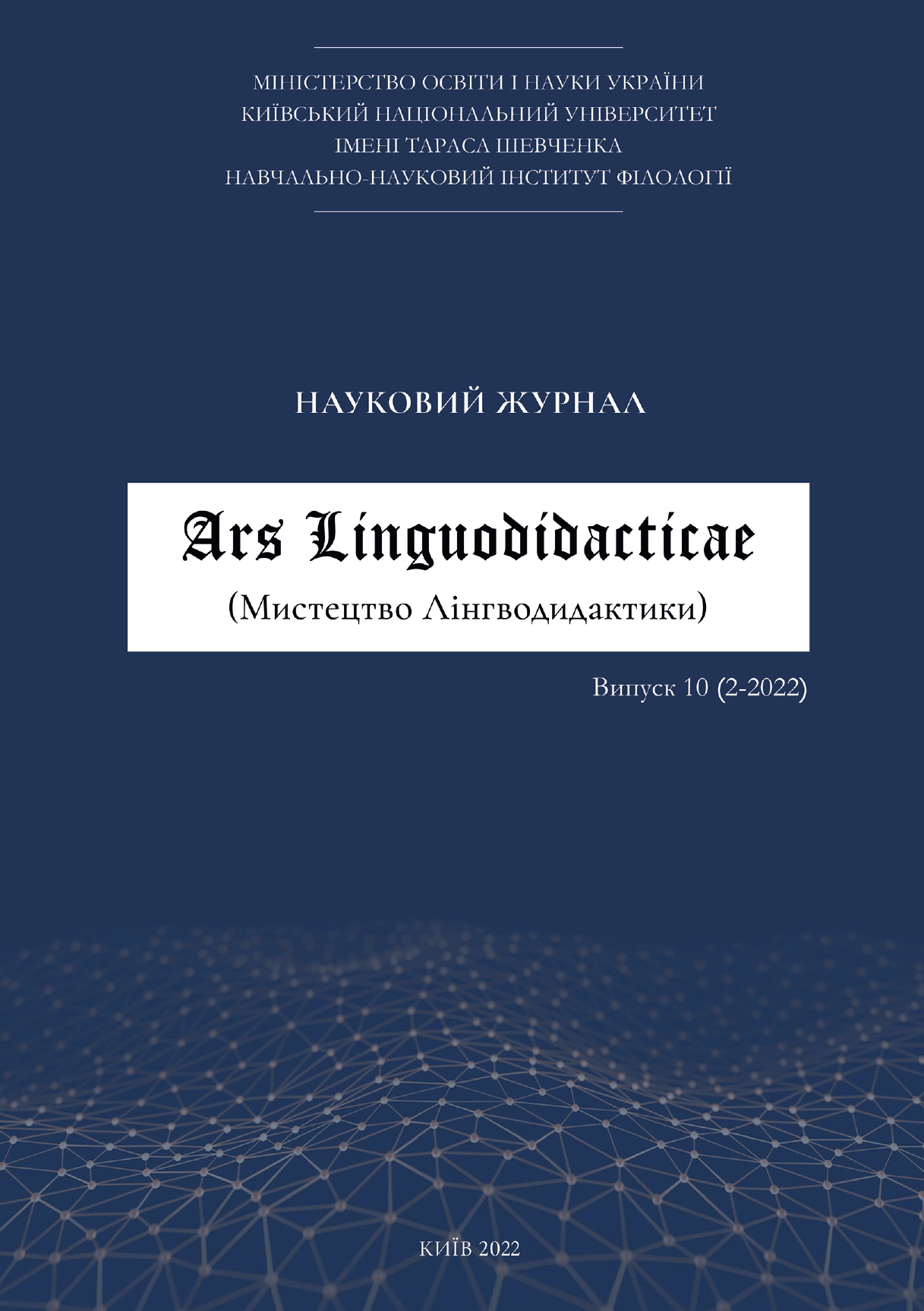ВИКОРИСТАННЯ ТЕХНОЛОГІЇ ДРАМАТИЗАЦІЇ В ПРОЦЕСІ РОЗВИТКУ ВМІНЬ АУДІЮВАННЯ УЧНІВ ПОЧАТКОВОЇ ШКОЛИ
DOI:
https://doi.org/10.17721/2663-0303.2022.2.04Ключові слова:
аудитивна компетентність, драматизація, учні початкової школиАнотація
У статті висвітлено питання використання драматизації в процесі формування англомовної аудитивної компетентності учнів початкової школи. Проаналізовано сутність поняття «аудитивна компетентність» та її зміст відповідно до рівня Перед-А1, визначеного у новій редакції Загальноєвропейських рекомендацій з мовної освіти (2020), обгрунтовано можливість застосування драматизації у навчанні англійської мови дітей молодшого шкільного віку та важливість її використання на початковому етапі навчання. Здійснений теоретичний аналіз наукових джерел з питань формування аудитивної компетентності, починаючи з висвітлення роботи психологічних механізмів аудіювання до специфіки навчання аудіювання у початковій школі. На підставі цього аналізу та урахування практичного досвіду роботи авторами розроблений комплекс вправ з формування аудитивної компетентності молодших школярів. У ньому представлені та описані етапи/підетапи роботи з формування аудитивної компетентності та їх зміст – вправи з інтегрованими елементами драматизації. Розроблений комплекс вправ проілюстрований практичною розробкою. Застосувавши комплекс вправ в умовах навчання молодших школярів, автори підсумовують, що метод драматизації є дієвим засобом оптимізації формування англомовної аудитивної компетентності учнів початкової школи на уроках англійської мови.
Посилання
Abramian, V. T. (2006). Teatralna pedahohika [Theatrical pedagogy]. Lenvit. (in Ukrainian).
Badan, A.A., Holikova, O.M. (2019). Teatralisatsiia iak pedahohichna tekhnologiia navchannia inozemnym movam [Theatricalization as a means of teaching foreign languages]. Aktualni problemy rozvytku ukrainskoho suspilstva [Issues of development of the Ukrainian society]. Bulletin of the National Technical University «KhPI», 1:78-82 (in Ukrainian).
Bihych, O. B. (2006). Teoriia i praktyka formuvannia metodychnoi kompetentsii vchytelia inozemnoi movy pochatkovoi shkoly [Theory and practice of the formation of the competence of methods of the teacher of a foreign language of primary school]. Lenvit. (in Ukrainian).
Council of Europe (2020). Common European Framework of Reference for Languages: Learning, teaching, assessment – Companion volume. Council of Europe Publishing, Strasbourg, available at www.coe.int/lang-cefr.
Kalinina, L.V., Shcherba, N.S., Prokopchuk. N. R., Kuzmenko, O. Y., & Grigoreva, T. Y. (2022). Na shlyakhu do profesiynoyi maysternosti: vid studenta do vchytelya. [The journey from an English learner to an English teacher]. Navchalnyy posibnyk. Vydavnytstvo Yevrovolyn. (in Ukrainian).
Kalko, R. M. (2011). Vykorystannia teatralnoi pedahohiky u pochatkovii shkoli [The usage of theatrical pedagogy in primary school]. Visnyk LNU imeni Tarasa Shevchenka,1(10), 215-221. (in Ukrainian).
Mykhailova, О., Humankova, О., & Grigorieva, Т. (2021). Vykorystannia dramatyzatsii u navchanni angliiskoi movy ditei molodshogo viku [Using drama in teaching English to primary school learners]. Ars Lsnguodidacticae, (6), 21–28. https://doi.org/10.17721/2663-0303.2021.6.03
Nikolayeva, S.Y. (Red.). (2013). Metodyka navchannya inozemnykh mov i kulʹtur: teoriya i praktyka. Pidruchnyk dlya studentiv klasychnykh, pedahohichnykh i linhvistychnykh universytetiv. [Teaching foreign languages and cultures: Theory and practice. Textbook for students of classical, pedagogical and linguistic universities.]. Lenvit. (in Ukrainian).
Roman, S. V. (2008). Metodyka navchannia anhliiskoi movy u pochatkovii shkoli [Methods of Teaching English in Primary School]. Lenvit. (in Ukrainian).
Samoylyukevich, I. V. Mykhaylova, O. S. Zimovets, O. A. Dengaeva, S. V. Vozniuk, O. V. Humankova, O. S., & Kravets, O. E. (2022). Inozemna mova za profesiynym spryamuvannyam: Navchalno-metodychnyy posibnyk z anhliyskoyi movy dlya studentiv vyshchykh navchalnykh zakladiv. [Foreign language for professional purposes: Workbook for students of tertiary level.]. Vydvo ZHDU im. I.Franka (in Ukrainian).
Zubryk, А. (2020). Interactyvni metody i pryiomy navchannia angliiskoi movy uchniam pochatkovyh klassiv [Interactive methods and techniques of teaching English to young learners]. Aktualni pytannnia humanitarnyh nauk [Issues of the humanities]. Mizhvuzivskyi zbirnyk naukovykh prats molodykh vchenykh Drohobytskoho derzhavnoho pedahohichnoho universytety imeni Ivana Franka. [Interuniversity collection of papers of young researchers]. 2(28), 87-92. (in Ukrainian).
##submission.downloads##
Опубліковано
Як цитувати
Номер
Розділ
Ліцензія
Авторське право (c) 2022 Оксана Михайлова, Ольга Гуманкова, Тетяна Григор’єва

Ця робота ліцензується відповідно до Creative Commons Attribution-NonCommercial 4.0 International License.
Ця робота ліцензується відповідно до Creative Commons Attribution-NonCommercial 4.0 International License.
Політика охорони авторських прав відповідно до умов ліцензії: Creative Commons Attribution-NonCommercial (Атрибуція-Некомерційне використання) 4.0 Міжнародна (CC BY-NC 4.0).
Автори, що публікують свої статті в журналі "Ars Linguodidacticae" (журналі відкритого доступу) зберігають за собою такі права:
- Автори зберігають за собою права на авторство своєї статті та надають журналу "Ars Linguodidacticae" право першої публікації рукопису своєї статті на умовах ліцензії Creative Commons (CC BY-NC 4.0) Attribution License, яка дозволяє іншим особам вільно розповсюджувати опубліковану роботу з обов'язковим посиланням на автора оригінальної роботи та першу оригінальну публікацію в журналі "Ars Linguodidacticae". Інформація про збереження права на авторство надається на титульній сторінці статті.
- Автори зберігають за собою право укладати окремі угоди на неексклюзивне розповсюдження своєї статті у тому вигляді, в якому вона була опублікована в журналі "Ars Linguodidacticae" (наприклад, розміщувати статтю в електронних бібліотеках, архівах та каталогах або публікувати у складі інститутських збірників та монографій), за умови обов'язкового повного посилання на першу оригінальну публікацію в журналі "Ars Linguodidacticae".
- Політика журналу "Ars Linguodidacticae" дає змогу та заохочує розміщення авторами в мережі Інтернет (наприклад в інститутському репозитарії або на персональному сайті) рукопису роботи як до її подання до редакції, так і під час її редакційного опрацювання, оскільки це сприяє продуктивній науковій дискусії та позитивно позначається на оперативності й динаміці цитування статті.
Редакція журналу зберігає за собою видавничі права на:
- зверстані оригінали статей та весь номер журналу;
- оформлення журналу, а також оригінальні ілюстративні та додаткові матеріали;
- репринтні перевидання журналу в друкованому та електронному вигляді.
Політика охорони авторських прав провадиться відповідно до умов ліцензії: Creative Commons Attribution-NonCommercial (Атрибуція-Некомерційне використання) 4.0 Міжнародна (CC BY-NC 4.0).
Для отримання додаткової інформації, будь ласка, прочитайте повний текст Публічної ліцензії CC BY-NC 4.0
Creative Commons Attribution-NonCommercial 4.0 International License.

